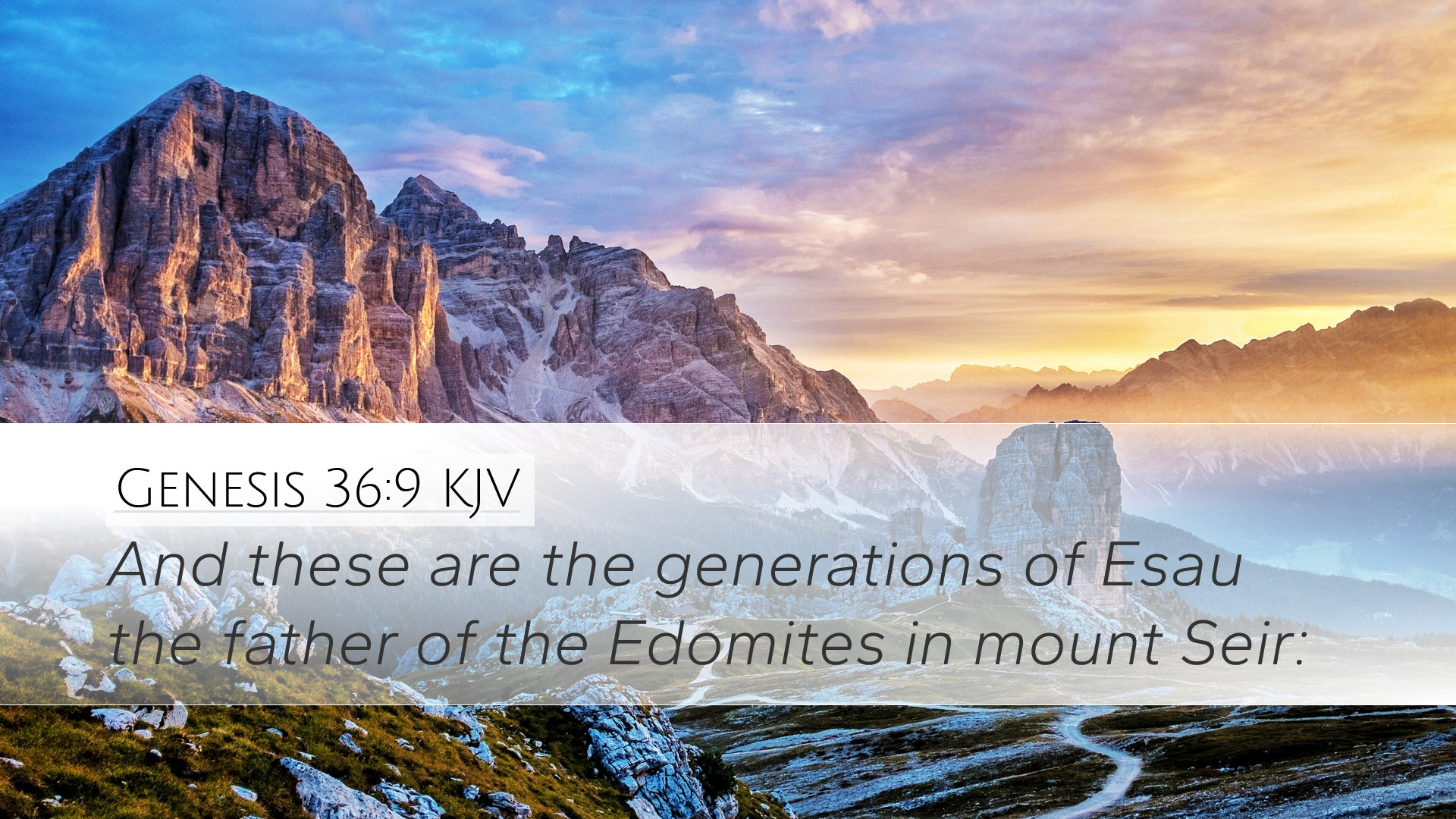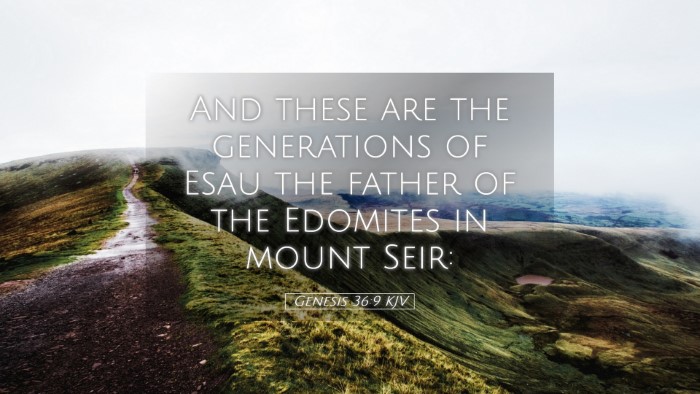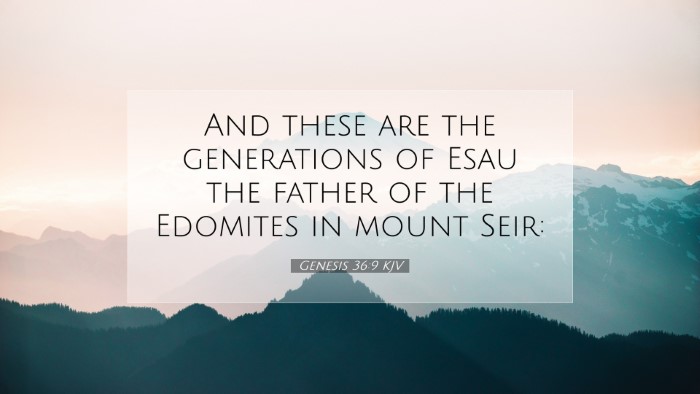Commentary on Genesis 36:9
Genesis 36:9 states, "And these are the generations of Esau the father of the Edomites in mount Seir." This verse serves as a pivotal introduction to the genealogical records concerning Esau, a significant figure in the patriarchal narratives. Through this commentary, we will explore the implications, historical context, and theological significance of this verse, drawing insights from esteemed public domain commentaries.
1. Contextual Background
Esau, the elder twin brother of Jacob, is a crucial character whose life and lineage are intricately woven into the broader narrative of Genesis. Understanding the dynamics of Esau's relationship with Jacob, as well as the historical backdrop of Edom in relation to Israel, is essential for a comprehensive appreciation of this scripture.
2. The Significance of Generational Records
Adam Clarke emphasizes that genealogies serve not just to trace family lines but also to illustrate divine providence and purpose. In this case, Esau's lineage highlights the emergence of the Edomites. This emphasis on genealogy in the biblical text reveals the importance of tribal identities and God's dealings with nations through their patriarchs.
2.1. Historical Context of Edom
Matthew Henry notes that the Edomites, descendants of Esau, settled in the region of Mount Seir. This area is significant geographically and theologically. The conflict between Edom and Israel, as illustrated in subsequent biblical narratives, underscores the ramifications of the choices made by Esau and Jacob. The family lineage hinted at in this verse sets the stage for understanding future interactions and tensions.
2.2. Theological Implications of Esau's Lineage
Albert Barnes points out that Esau's role as the father of the Edomites extends beyond mere ancestry; it denotes a destinical distinction between two nations. The Edomites often represent those who are outside of the covenant community established through Jacob. This distinction has profound implications for understanding God's unfolding plan of redemption, showcasing how secular histories intertwine with divine purposes.
3. Analysis of Key Terms
Examining the phrase "father of the Edomites" in Genesis 36:9 reveals rich meanings. The term "father" denotes not just biological relationship but also a role of guidance and leadership in the establishment of a nation. Such identification can be interpreted as a commentary on identity formation, culture, and the intrinsic connection between a people and their patriarch.
3.1. "In mount Seir"
The geographical reference "in mount Seir" suggests a settled and distinct territory for the Edomites. As highlighted by Matthew Henry, this region became a center of Edomite life and culture. The location is emblematic of their separation and differentiation from the Israelites, reinforcing the theme of conflict and rivalry in the narrative of the two nations.
4. Esau's Legacy
Esau's legacy is a complex tapestry of themes such as rejection, rivalry, and divine sovereignty. Clarke offers a poignant reflection on the distinction between the chosen lineage of Jacob and the rejected line of Esau. This distinction raises crucial questions regarding God’s choice and the nature of His covenant. The tensions arising from this familial conflict continue to resonate and reappear throughout biblical history.
4.1. The Role of Choice in Esau’s Story
Esau's story is a reminder of the implications of choice. His disregard for the birthright and the blessings which belonged to him highlight human tendency towards immediate gratification over long-term spiritual blessing. Albert Barnes encourages readers to reflect on the significance of priorities in life, showing how such decisions affect not only the individual but also entire nations.
5. Implications for Contemporary Readers
For pastors, students, and theologians today, Genesis 36:9 poses an opportunity for introspection and understanding. The character of Esau invites exploration of themes such as identity, heritage, and the implications of choices. This passage underscores the importance of recognizing one's place in God's narrative and the eternal consequences that arise from our decisions.
5.1. The Importance of Reflection
As modern readers engage with this genealogy, an emphasis on self-examination is warranted. In the spirit of Jacob and Esau's rivalry, there lies a broader message about reconciliation and the possibility of unity despite differences. The ongoing conflicts between nations and within families today echo the ancient narratives of Genesis.
6. Conclusion
Genesis 36:9 serves not simply as a passage regarding genealogical lineage; it provides a theologically rich landscape illustrating divine sovereignty, human choice, and the formation of nations. Within its brevity lies an abundance of insights that continue to resonate in contemporary contexts. As we delve into this verse, we are reminded of the significant choices that shape our lives and the lives of future generations.
In conclusion, this verse captures key themes that instruct our understanding of God's covenantal work, the nature of identity, and the historical realities that form the backdrop of biblical narratives. The richness of these insights from public domain commentaries encourages deeper investigation and reflection, inviting us all to engage meaningfully with the text.


